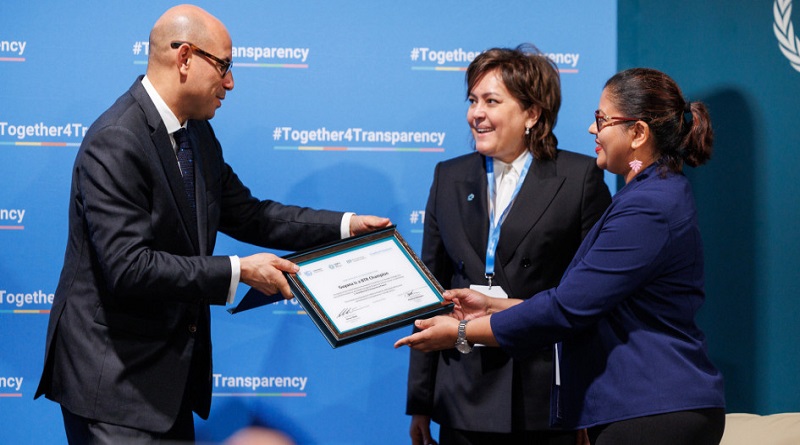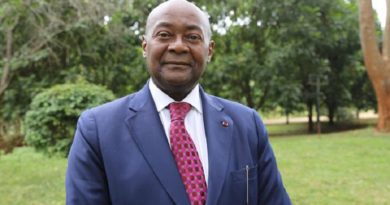Paris Agreement: COP29 celebrates first submissions of BTRs as vital enablers of climate action
Photo caption: UN Climate Change Executive Secretary Simon Stiell (left) hands a BTR recognition certificate to Pradeepa Bholanath (right), Senior Director for Climate and REDD+, Guyana. Credit: UN Climate Change | Habib Samadov
UN Climate Change and the COP29 Presidency celebrated the start of a new chapter in global climate transparency during COP29, with the first submissions of Biennial Transparency Reports (BTRs) under the Paris Agreement.
With the 31 December 2024 deadline for BTR submissions drawing near, UN Climate Change and the COP29 Presidency hosted two high-level events to recognize frontrunner countries that submitted their reports in the lead-up to and during COP29, marking full implementation of the Enhanced Transparency Framework (ETF).
On 12 November, the High-Level #Together4Transparency Opening Event set the stage for these celebrations. UN Climate Change Executive Secretary Simon Stiell and Azerbaijan’s Deputy Minister of Ecology and Natural Resources Umayra Taghiyeva commended Guyana, Panama and Spain for their early BTR submissions.
“Transparency enables stronger climate action,” Stiell said. “Each Biennial Transparency Report represents a milestone, capturing the strides made and charting the path ahead.”
Stiell presented representatives from the recognized countries with certificates acknowledging their efforts and commitment as “champions” of climate transparency.
A High-Level Ministerial Roundtable on 18 November celebrated additional early BTR submissions by Andorra, Germany, Japan, Kazakhstan, the Maldives, the Netherlands, Singapore and Türkiye, building political momentum towards enhanced transparency of climate action.
During this session, countries welcomed the Baku Transparency Platform (BTP), an initiative by the COP29 Presidency to enhance participation in the ETF and streamline existing transparency support, especially for developing countries.
“BTRs provide high-quality, consistent climate data, offering predictability for investment. When data is measured regularly and shared openly, countries are more likely to meet and exceed their commitments,” said Inger Andersen, UN Under-Secretary-General and Executive Director of the United Nations Environment Programme.
Jennifer Morgan, Germany’s State Secretary and Special Envoy for International Climate Action, underscored the link between transparency and international cooperation: “Trust is at the heart of reaching agreement in any negotiation. That’s why transparency in climate negotiations is so important.”
Reflecting on the unifying role of transparency, Prime Minister Philip Davis of the Bahamas stated that “Transparency is the thread that unites us all.”
The events also offered a space for countries to share their experiences in gathering data and preparing their reports.
Azerbaijan and the European Union also submitted their BTRs during the last few days of COP29. UN Climate Change anticipates many more BTR submissions in the coming weeks.
The reports will then undergo technical expert reviews, followed by the Facilitative Multilateral Consideration of Progress, where countries will share successes and challenges to ensure a comprehensive understanding of progress and gaps.
These reports will serve as a cornerstone for international climate action in the years and decades ahead, providing the robust, evidence-based insights needed to guide national actions to address the climate crisis.




